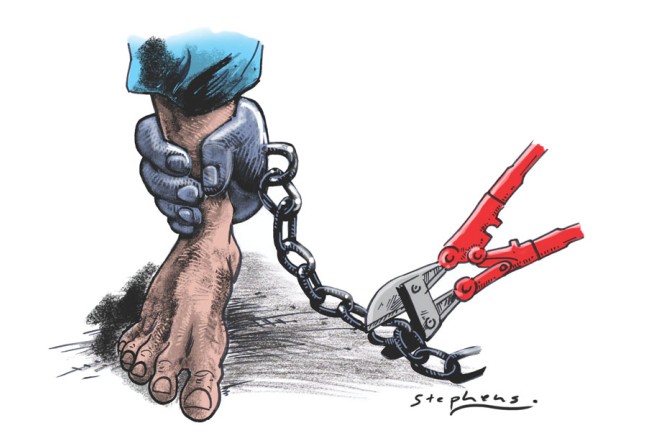Breaking the chains of human trafficking in Hong Kong
Archana Kotecha says though the cogs of legal reform turn slowly, much can still be done in Hong Kong to combat human trafficking and improve the plight of victims, ultimately benefiting society

We are at a crossroads. Human trafficking is a human rights violation that cuts across different echelons of society and has a devastating impact not only on its victims but also on the societies where it exists. Hong Kong has various nationalities of sex workers, migrant workers, asylum seekers and young people from underprivileged backgrounds, all groups affected by human trafficking.
Trafficking also attacks the very fabric of society, as it is a form of organised crime that encourages the proliferation of crime and undermines the rule of law.
For us to move forward, we must acknowledge that trafficking for forced labour and debt bondage do take place in Hong Kong. This involves recognising the need for legal reform, renewed victim protection measures, better investigation, collaboration between organisations, improved data collection and management systems, and getting in line with the international definition of human trafficking.
Prolonging the status quo is fraught with difficulties given recent events, in particular employer brutality against foreign domestic helpers like Kartika Puspitasari and the alleged abuse of Erwiana Sulistyaningsih - plus reports of extreme overcharging of agency fees, which often leads to debt bondage.
There is mounting pressure on the government to address the issue of trafficking for forced labour. Hong Kong's reputation as a leading society in Asia surely must preclude it from maintaining the status quo. Acknowledging and attempting to resolve the issue will ultimately benefit Hong Kong as a society, and the communities that rely on domestic workers to allow households to function.
The relatively recent amendment to the Prosecution Code, which reflects the internationally accepted understanding of human trafficking, is a strong prelude to positive action on the counter-trafficking scene. We now have the opportunity to lead the way in Asia by making changes that will protect victims and society while interrupting the activities of traffickers.
It is true that legal reform is a slow and intensive process. But, while the government rightly considers its stance and conducts an assessment for new anti-trafficking legislation or amendments to existing laws, much can be done to improve the plight of victims affected by trafficking for forced labour.
In particular, the government can step up the measures it has in place, including by building on existing training of key staff within immigration and law enforcement on victim identification; sharing publicly the results of the police's enhanced data protection mechanism for crimes relating to foreign domestic helpers; and, stepping up collaboration with source countries to identify those third party brokers, agencies and loan companies that take advantage of vulnerable migrants by overcharging for placement fees, thus encouraging the practice of cumbersome debt-taking. The burden of this debt often makes migrant workers vulnerable to abuse and exploitation by limiting their ability to remove themselves from an abusive situation.
To enhance existing measures, the government can draw inspiration from the successes and challenges of other nations. For example, a national plan of action would be a good first step to allow a measured response to human trafficking. This holistic approach would involve action to improve prosecution, protect victims' rights and enhance prevention of this crime. It is also a great opportunity to consult stakeholders. A proactive plan would position Hong Kong very favourably in its fight against human trafficking.
Putting in place a national referral mechanism that formalises identification and support services for victims is another step to consider. This provides an effective system that allows fair treatment for all suspected trafficking victims while their case is considered. It is widely used in Europe as part of the domestic implementation of the Council of Europe Convention on Action Against Trafficking in Human Beings. An adapted version tailored to Hong Kong's needs would greatly benefit identification of victims and provide a credible means of data collection and management.
In fact, Hong Kong's response to trafficking will improve with a better understanding of the situation on the ground. Although the national referral mechanisms in Europe are grounded in a wealth of anti-trafficking legislation, the Hong Kong government should consider using existing legislation against sex trafficking and slavery to ground its own system.
Guidance can also be derived from current practices used to train law enforcement forces on identification of victims. Presumed victims, rather than presumed criminals, would be granted access to support services and a "recovery and reflection" period of 45 days to allow them to decide whether to collaborate with police. It would also give law enforcement officials time for further investigations and to ascertain whether the individual is indeed a victim. A referral mechanism presents an opportunity to create a system that promotes victims' rights and supports law enforcement activities simultaneously. This will, in turn, lead to better collaboration between victims and the police, and promote prosecution of traffickers.
The government, anti-trafficking community and, ultimately, victims will benefit from research into the existence of slavery and slavery-like practices in Hong Kong. The research should examine different sectors, such as domestic work and construction work, and explore the various groups prone to exploitative practices, for example, migrant workers, asylum seekers and sex workers.
There is much that can be achieved while the cogs of the legal reform machinery slowly start to move. Better communication and dialogue between the government and frontline service providers will pave the way for an improved response to human trafficking.
As a society and a city that prides itself on successes on the political, legal and economic front, we can lead the way in our respect for basic human rights and human dignity.
Archana Sinha Kotecha is head of legal at Liberty Asia